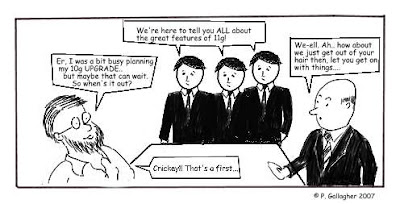This week its my pleasure to host Log Buffer #54, the Carnival of the Vanities for DBAs. Thanks to Dave Edwards at
Pythian for the invite to put this together.
Dave must be a very chilled sorta guy to be able to survive each Friday, not knowing what on earth his guest editor is going to churn out!! Of course 11g continues to be a big topic this week.
Dan Norris adds his views on the
best 11g new features to the flurry that came out last week. Christian Bilien's having a party to celebrate
ASM fast mirror resync. Syed Jaffar Hussain discovers the alert log
will now be XML. Personally I shudder; still not convinced that XML is appropriate for log files.
It strikes me that in this period between launch and
release, there's more eyeballs on docs that at any other time in the product lifecycle;)
NB: There still seems to be some confusion whether we are meant to know when 11g will arrive or not. Steven Chan's older post almost convinced me there's a good reason why we don't hear dates;) In the SQL Server world, Kalen Delaney blogs in wonderment having discovered the
dialog box that time forgot. And Bob Beauchemin has some good SQL Server
book reviews.
While on book reviews, Stewart Smith is
impressed by O'Reilly's Backup & Recovery because it covers just about every way to back up and recover systems (I trust not
this way).
So did PostgreSQL trounce Oracle or not? Kevin Closson
exposed the lazy reporting that seems to have sparked this "non-story". But you know how pointless it is to try and correct the facts
once they are out on the net, right? Its a pity for the controversy, because as
Jay Pipes writes, the benchmark achievement is no mean feat for the PG dev team.
Lots of interseting stuff on mysql this week. Mats Kindahl takes mysql proxy for a
decent test drive, concludes it has great potential and offers some constructive comments on gaps to be filled. The
MySQL 5 HA with DRDB and Heartbeat guide is very well put together by Mark Schoonover (who blurs the line between blog post and technical reference guide!)
What do I like most about open source? Take something like Jay Pipes
internals of MyISAM Concurrent insert (part 1 posted this week). Great example of hard core geek writings. Can you ever imagine Oracle, IBM or Microsoft getting down and dirty on internals like this? I love it!
Moving on to deeper thoughts...
K. Brian Kelley mulls over
what it means to be a dba, but might be surprised that Patrick Wolf stumbled across an 11g feature that means
DBA's may put Java/SOA guys out of work.
Doug Burns ponders just
how many blogs a person should have, and in the process gave quite a few pause for thought.
Over in the
Oracle Forums, activity seems to be at a high but one wonders about the signal to noise. I think Sidhu was
remarkably restrained when I think my response may just have been jfgi!
... and that's pretty much a wrap for this week. Thanks for reading my first attempt at editing the Log Buffer. It just remains for me to leave you with my lame attempt at a bit of 11g humour. Keep on blogging!

 simple challenge of differentiating human from non-human automated clients (great podcast as always .. check it out). Commonly this is done with distorted text like the sample on the right.
simple challenge of differentiating human from non-human automated clients (great podcast as always .. check it out). Commonly this is done with distorted text like the sample on the right. 










